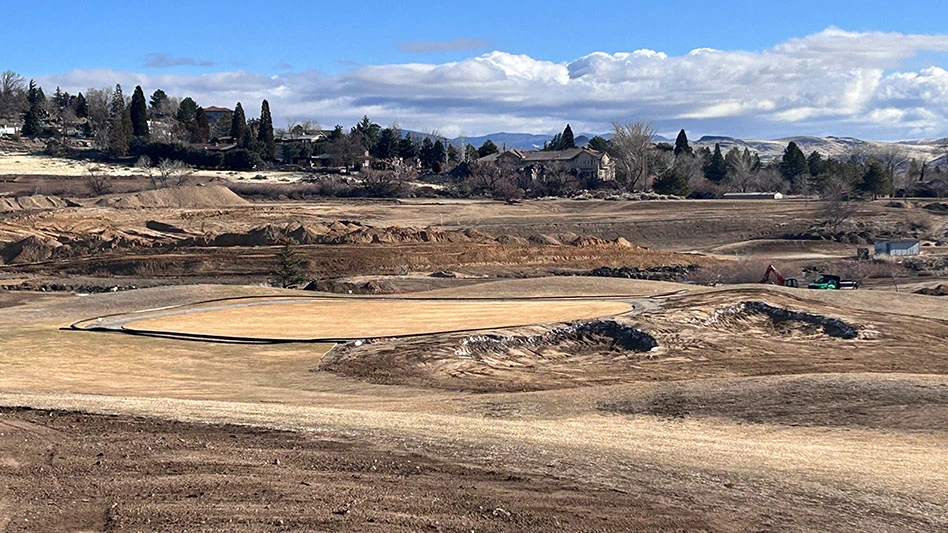I’ve had the privilege of working on each of the “big three” types of courses: a resort, a country club and a municipality. The experiences and knowledge I gained have proven to be invaluable. I often hear recent turf school graduates say they only would consider working on a resort course, country club or tournament course. This narrow-mindedness closes doors before they even open. Each type of course offers a wealth of benefits. By considering all options, they could find themselves in a beloved position.
I started my golf career at The Broadmoor Hotel and Golf Club in Colorado Springs, Colo., in 1995. It was host to the 1995 U.S. Women’s Open, under the direction of Tommy Anderson, CGCS.
I was a fish out of water running the East Course and Broadmoor grounds irrigation. There was more than enough work to go around and I never had a dull day. Because it’s the lifeblood of a course, irrigation is a great place to start a golf course maintenance career. I spent only a year at the resort, but what I learned in that short amount of time made my other golf positions a piece of cake. I still reminisce about my days at the Broadmoor whenever I’m installing, troubleshooting and digging up those nasty leaks that cover you in mud from head to toe.
The Woodmoor Pines Country Club in Monument, Colo., was the next rung on my career ladder. There I worked directly with Scott Kresenbach, CGCS, and again irrigation was my main focus.
Woodmoor’s irrigation was unique. The front nine was a block system and the back nine was a normal open hydraulic system. The normal open hydraulic system kept us all very busy. The other great challenge was dealing with the board of directors and the newly appointed greens committee chairman. It seemed every new greens committee chair had his or her own agenda. Some ideas would benefit the course, but many served special interests. Dealing with the different personalities within a country club is demanding. I’m sure there’s not a country club superintendent alive that’s pleased with the entire membership.
For the past seven years, I’ve happily been at Patty Jewett Golf Course, which is owned by the city of Colorado Springs. It’s a 27-hole facility established in 1898, located in the heart of the city. When I accepted the job I realized the course probably never would host a major event. However, it was the city’s entire package that helped me recognize that it was the right decision for my family and me.
This position has been rewarding because working on a high-quality, city-owned course has many pluses. There are, of course, many challenges at a public course. Joe Public is at the top the list. There are all types of patrons that come through the door.
The gates open at 6 a.m. in the summer, and they’re teeing each nine at 6:07 a.m. By 10 a.m., all three nines are packed. Like so many golf courses, the mornings are extremely busy for the maintenance staff. If one employee calls in sick, or if a unit has mechanical trouble, we play catch-up all day. The public waits for no one. Additionally, the irrigation system is the top priority. No matter how hard you try – that’s one thing you can’t escape.
I’ve failed to mention that the pump station is the best way to learn a lot in a short time.
When the pump station technician shows up, watch him and ask a lot of questions. He’ll usually share valuable information with you. Most of the time, he’ll provide basic troubleshooting techniques that you can perform before he makes a trip to your course. In my area, the pump station technicians are spread pretty thin, and the pump usually likes to fail in the heat of the summer when no rain is in the forecast. Having some pump station knowledge helps you out in these circumstances.
Based on my experiences, I’d recommend college students take internships at different types of courses and assistants be open-minded about different types of facilities. Your opinions of the different types of facilities may change, but even if they don’t, at least you’ve experienced all sides of the golf course industry.
Keep your options open and you’ll be surprised about what you’ll learn. GCI
I started my golf career at The Broadmoor Hotel and Golf Club in Colorado Springs, Colo., in 1995. It was host to the 1995 U.S. Women’s Open, under the direction of Tommy Anderson, CGCS.
I was a fish out of water running the East Course and Broadmoor grounds irrigation. There was more than enough work to go around and I never had a dull day. Because it’s the lifeblood of a course, irrigation is a great place to start a golf course maintenance career. I spent only a year at the resort, but what I learned in that short amount of time made my other golf positions a piece of cake. I still reminisce about my days at the Broadmoor whenever I’m installing, troubleshooting and digging up those nasty leaks that cover you in mud from head to toe.
The Woodmoor Pines Country Club in Monument, Colo., was the next rung on my career ladder. There I worked directly with Scott Kresenbach, CGCS, and again irrigation was my main focus.
Woodmoor’s irrigation was unique. The front nine was a block system and the back nine was a normal open hydraulic system. The normal open hydraulic system kept us all very busy. The other great challenge was dealing with the board of directors and the newly appointed greens committee chairman. It seemed every new greens committee chair had his or her own agenda. Some ideas would benefit the course, but many served special interests. Dealing with the different personalities within a country club is demanding. I’m sure there’s not a country club superintendent alive that’s pleased with the entire membership.
For the past seven years, I’ve happily been at Patty Jewett Golf Course, which is owned by the city of Colorado Springs. It’s a 27-hole facility established in 1898, located in the heart of the city. When I accepted the job I realized the course probably never would host a major event. However, it was the city’s entire package that helped me recognize that it was the right decision for my family and me.
This position has been rewarding because working on a high-quality, city-owned course has many pluses. There are, of course, many challenges at a public course. Joe Public is at the top the list. There are all types of patrons that come through the door.
The gates open at 6 a.m. in the summer, and they’re teeing each nine at 6:07 a.m. By 10 a.m., all three nines are packed. Like so many golf courses, the mornings are extremely busy for the maintenance staff. If one employee calls in sick, or if a unit has mechanical trouble, we play catch-up all day. The public waits for no one. Additionally, the irrigation system is the top priority. No matter how hard you try – that’s one thing you can’t escape.
I’ve failed to mention that the pump station is the best way to learn a lot in a short time.
When the pump station technician shows up, watch him and ask a lot of questions. He’ll usually share valuable information with you. Most of the time, he’ll provide basic troubleshooting techniques that you can perform before he makes a trip to your course. In my area, the pump station technicians are spread pretty thin, and the pump usually likes to fail in the heat of the summer when no rain is in the forecast. Having some pump station knowledge helps you out in these circumstances.
Based on my experiences, I’d recommend college students take internships at different types of courses and assistants be open-minded about different types of facilities. Your opinions of the different types of facilities may change, but even if they don’t, at least you’ve experienced all sides of the golf course industry.
Keep your options open and you’ll be surprised about what you’ll learn. GCI

Explore the April 2009 Issue
Check out more from this issue and find your next story to read.
Latest from Golf Course Industry
- The Cabot Collection announces move into course management
- Carolinas GCSA raises nearly $300,000 for research
- Advanced Turf Solutions’ Scott Lund expands role
- South Carolina’s Tidewater Golf Club completes renovation project
- SePRO to host webinar on plant growth regulators
- Turfco introduces riding applicator
- From the publisher’s pen: The golf guilt trip
- Bob Farren lands Carolinas GCSA highest honor






